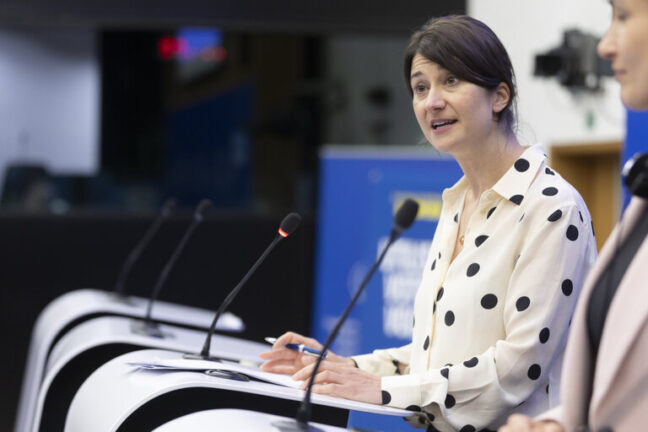EU member states have agreed to significantly narrow the scope of the Corporate Sustainability Due Diligence Directive (CSDDD) and scale back the related Corporate Sustainability Reporting Directive (CSRD). The deal follows the European Commission’s “stop-the-clock” directive, approved earlier this year by the Council.
This directive, part of the broader “Omnibus” legislative package aimed at reducing regulatory burdens, had already substantially diluted both laws by delaying timelines and reducing the number of companies affected and weakening reporting obligations. With the latest agreement, both directives face even further rollbacks.
“Today we delivered on our promise to simplify EU laws,” Adam Szłapka, Poland’s Minister for the European Union said on behalf of the Council presidency. “We are taking a decisive step towards our common goal to create a more favorable business environment to help our companies grow, innovate, and create quality jobs.”
Reduced scope of due diligence
Under the revised agreement, the CSDDD will now apply only to companies with more than 5,000 employees and annual revenues exceeding €1.5 billion. The 2023 version of the law had set the threshold at 1,000 employees and €450 million in turnover. While the Commission initially proposed keeping the threshold unchanged, member states pushed for this increase. A review clause was added, allowing for a possible future expansion of the law’s scope.
According to research by the Centre for Research on Multinational Corporations (SOMO), the revised rules would now apply to fewer than 1,000 corporate groups across the EU. More than 70% of companies that were previously covered will now be exempt. Only six countries, France, Germany, Italy, the Netherlands, Spain, and Sweden, have companies large enough to meet the new threshold, their research shows.
You might be interested
In line with the Commission’s proposal, member states have also agreed that investigations into corporate abuses should focus primarily on direct suppliers. They further narrowed the directive by limiting investigation duties to areas where the risk of abuse is highest.
Civil liability provisions to be dropped
The Council also proposed to drop civil liability provisions, once seen as a core pillar of the directive, entirely from the rulebook. That is in line with the Commission’s proposal. Critics say this risks undermining the single market and turning the law into what CSDDD rapporteur Lara Wolters (S&D/NL) called a “nightmarish legal patchwork.”
“Without harmonised liability rules, there is no action to prevent sweatshops collapsing on workers,” Wolters said. “No action to ensure your products aren’t made in Uyghur prisons, no action to stop warlords profiting from our need for minerals, and no action even to keep children in schools instead of sweatshops.”
Increasing opposition to Due Diligence Directive
The rollback of the CSDDD comes as France and Germany have called for a complete dismantling of the law. In May, German chancellor Friedrich Merz said “we will revoke the national law in Germany, and I also expect the European Union to follow suit and really cancel this directive.” French President Emmanuel Macron echoed that view a few weeks later, starting that “CSDDD and some other regulations not just have to be postponed for one year, but put off the table”.
Wotlers sharply critizised Macron for this position: “President Macron is categorically wrong: repealing EU rules on responsible business would signal companies have the right to pocket profits made through exploitation annd environmental damage. He is advocating for private gains and public losses. Europe is better than this. It should stand for green jobs and high product standards. Mr Macron should act like a leader, not a follower of Mr Trump’s cannibalist-style capitalism and giving in to demands from the climate-denying fossil fuel industry and their financial backers”, she posted on Bluesky.
Dutch government party VVD, part of Renew Europe within the European Parliament, similarly submitted a motion in its national parliament in early June. It called for cancellation of both the CSRD and CSDDD in Brussels. The motion failed by just three votes.
Pressure to alter the CSDDD is not confined to Europe’s borders. In December 2024, Qatar threatened to halt LNG exports to the EU in response to the proposed directive, warning that fines for human rights or environmental violations in supply chains were unacceptable. Under the CSDDD, companies can face fines of up to 5% of their annual global turnover if management fails to act on serious human rights or environmental violations. “If I lose 5 percent of my revenue by supplying Europe, I won’t supply Europe. I am not bluffing,” Qatari Energy Minister Saad Sherida al-Kaabi told the Financial Times.
Sustainability reporting also weakened
The accompanying CSRD, which requires companies to monitor and report on the social and environmental impact of their supply chains, has also been scaled back. Where the original law required reporting from firms with just 250 employees, the new version only applies to companies with at least 1,000 employees and €450 million in turnover. The Council’s proposal goes even further than the European Parliament’s current position. It favors a threshold of 3,000 employees but keeps the €450 million revenue requirement.
Climate obligations have been similarly diluted. Companies are now merely required to adopt a climate transition plan, not implement. National authorities are limited to offering advice rather than enforcement. The deadline for adopting such plans has also been delayed by two years, to 2028.
European People’s Party’s spectacular U-turn
Commission President Ursula von der Leyen’s European People’s Party (EPP) was originally in favor in sharper due diligence rules. In 2022, MEP Axel Voss (EPP/GER) described due diligence rules as “an important step” toward making companies accountable for their value chains. Now, the EPP is spearheading efforts to roll back both directives. “Cutting unnecessary red tape and simplifying rules is essential for growth, jobs, and future prosperity,” Tomas Tobé, EPP Group Spokesman for the Omnibus simplification package, said.
European Commission has become the headquarters of the EPP – MEP Lara Wolters (S&D/NL)
European Commission officials have echoed this language, prompting accusations of political bias. “The Commission has become the headquarters of the EPP,” Wolters said on Bluesky. “It’s showing a blatant disregard for the legislative process.”
NGOs critisize the move
Critics argue that framing the issue as a choice between competitiveness and values is a false dichotomy. They maintain that robust environmental and human rights protections are not an obstacle, but a precondition for sustainable economic resilience.
“The European Council has agreed on a negotiating mandate based on what can only be described as a total gutting of the CSDDD,” Ruwan Subasinghe, legal director at the International Transport Workers’ Federation, wrote on social media platform.
Environmental group ClientEarth further warned that the diluted proposals could violate EU law by weakening corporate sustainability obligations. Their legal analysis cites potential breaches of the principles of legal certainty, environmental integration, and the Charter of Fundamental Rights. The failure to conduct climate impact assessments may also expose the proposals to legal challenges, according to the NGO.
Members of the European Parliament had until Friday, 27 June to submit amendments to the Parliament’s position. Now, the Parliament’s position is to be finalized, and trilogue negotiations between the Parliament, Commission, and Council will begin.











